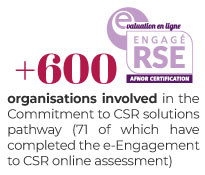
Sustainable development isn’t just for big business! In response to social, societal and environmental pressure, VSEs, SMEs and public-sector players are also getting to grips with the subject, adopting more ethical and sustainable practices. Various methods can be used to assess the performance of an SD policy. CSR managers or sustainable development officers must implement actions or tools to support the approach and show stakeholders the concrete results achieved.
Step 1: ISO 26000 self-assessment

First step: self-assessment using the AFNOR group’s online tools. The 20-point “Diag RSE online” questionnaire provides an initial measure of performance. It provides a CSR risk profile and a self-assessment report. In the same spirit, the 20 questions in the “Diag RSE online Contributeur ODD” self-assessment tool provide some initial elements for situating ourselves.
Step 2: Apply for the Engagé RSE label
The process continues with AFNOR’s “Engagé RSE” label, which involves an on-site audit and assessment. Based on the requirements of ISO 26000, SD 21000 and GRI, this label commits the company to continuous improvement over the long term. It’s also an excellent way of enhancing the company’s image, both internally and externally.
The Engagé RSE label is accompanied by a European-wide recognition mark: Responsibility Europe. Find out what organizations certified by AFNOR Certification have to say!
These signs of recognition strengthen our sustainable development and CSR policies. It’s an opportunity to challenge your approach with an objective perspective and the external eye of a third-party auditor. They “professionalize” the approach and enable communication on its overall performance.
